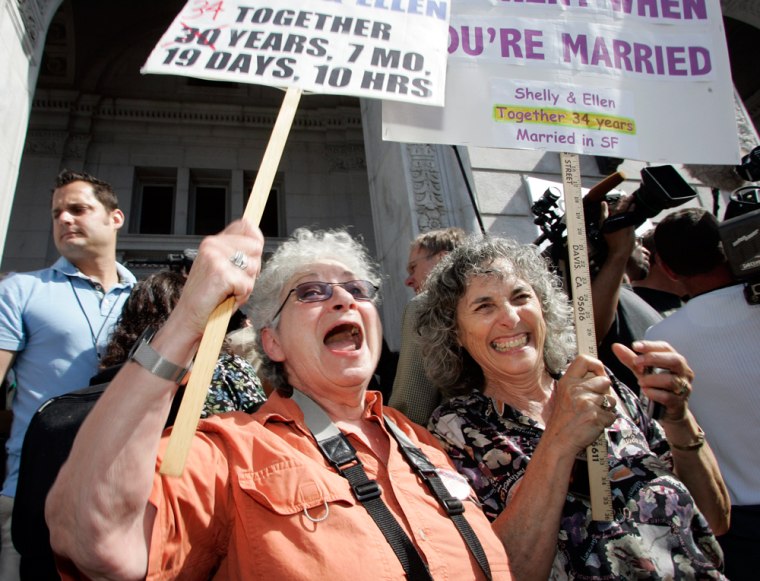Gay marriage is an issue on which the three major presidential candidates — John McCain, Barack Obama and Hillary Rodham Clinton — are pretty much in agreement. All oppose it, while saying at the same time that same-sex couples should generally be entitled to the legal protections afforded married couples. All think the decision should be left to the states.
And not one has shown any eagerness to make the issue a priority. Senator McCain, for example, did not mention it in a speech he gave Thursday outlining what he wanted to do as president.
But the decision by the California Supreme Court on Thursday overturning the state’s ban on same-sex marriage seems likely to put the issue back onto the national political stage for the time being. In the process, it should offer a test of whether the issue is resonant in American politics or whether it has fallen to the side of the road, as many Democrats and some Republicans say.
“The court has interjected itself into national politics and made same-sex marriage a major issue in the upcoming national election,” said Brian S. Brown, the executive director of the National Organization for Marriage in California, which opposes same-sex marriage.
Outside groups may seize on issue
Mr. Brown predicted that Senator Obama, who is leading in the race for the Democratic presidential nomination, and Mr. McCain, the all-but-certain Republican nominee, would be forced to deal with this issue repeatedly between now and November. Republicans did use the issue in 2004 in an effort to get conservative voters to help President Bush win Ohio.
This year, the decision in California could at the very least have resonance with socially conservative voters in places like Ohio and Pennsylvania. Even if Mr. McCain does not wield it as part of his fall campaign — and his political associates said he almost certainly would not — history suggests that independent conservative advocacy groups would seize on the ruling to try to define Mr. Obama and his party as culturally out-of-step. Presumably, it is just a matter of time until voters across the country see advertisements including same-sex couples taking their vows on the steps of San Francisco City Hall.
There is considerable debate whether the marriage issue helped Republican candidates in 2004. And it seems questionable if voters are going to find it compelling this year, at a time when the country is facing a prolonged war, an ailing economy and skyrocketing gasoline prices, the issues that Mr. McCain and the two Democratic candidates are confronting on the campaign trail every day.
“At best, it doesn’t move voters, and at worst for Republicans, it moves them against them,” said Matthew Dowd, who was chief strategist for Mr. Bush’s campaign in 2004. “Not so much on the issue, but it becomes, ‘Why are we having a discussion on this issue when we should talking about things that matter, like the economy, or health care, or the war?’ ”
Joe Solmonese, the president of the Human Rights Campaign, a gay rights organization, said: “Regardless of where the American people have moved on marriage, what you have to look at is where it places in their priorities. I don’t see it being the same kind of issue that it was in 2004.”
Wrong candidates for this fight?
If there is to be a national debate over the merits of same-sex marriage, the presidential candidates may not be the best proxies to carry out these arguments.
Mr. McCain supports marriage “between a man and a woman” and opposes any legal recognition of a same-sex relationship. But he is against an amendment to the Constitution, backed by many conservatives, that would ban same-sex marriage. More pressingly, he is at a point in his campaign now where he is seeking to appeal to moderates and Democrats uncomfortable with Mr. Obama; Mr. Dowd argued that emphasizing social issues would repel those groups.
Mr. Obama and Senator Clinton are more explicit in their support of civil unions, but both campaigns were quick to restate their views that the candidates believe the act of marriage should be between a man and a woman, a formulation that seems to have succeeded in taking the sting out of the issue.
Yet there are differences of nuance in how the Democratic and Republican candidates talk about the issue that could have resonance with socially conservative voters. For example, Mr. Obama’s campaign explicitly said that he “has always believed that same-sex couples should enjoy equal rights under the law, and he will continue to fight for civil unions.”
Plenty to think about
In California, Mr. Brown is leading an effort to force a voter initiative that would overturn the court decision. If Mr. McCain decides to back such an initiative, it could provide a point of contrast that conservatives could use to hurt Mr. Obama. And an initiative could bring out more conservative voters at a time when Mr. McCain’s advisers see a small hope of putting California in play.
But if Mr. McCain were to actively support such an initiative, it would put him in the uncomfortable position of working against Gov. Arnold Schwarzenegger, the Republican whose success at appealing to moderates is part of the model of Mr. McCain’s national campaign. Mr. Schwarzenegger said he would uphold the court ruling and oppose any such initiative.
A survey taken by the Pew Research Center last October found that 55 percent of respondents said same-sex marriage would be not at all important or not too important to their decision of whom to support for president; 43 percent said it would be somewhat important or very important.
And that was at a time when gasoline prices seemed low and the economy seemed stable. So the California Supreme Court may have created a laboratory to test once and for all just how powerful this issue really is.
This article, , first appeared in .
